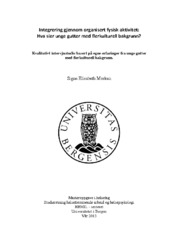Integrering gjennom organisert fysisk aktivitet: Hva sier unge gutter med flerkulturell bakgrunn?
Master thesis
Permanent lenke
https://hdl.handle.net/1956/7434Utgivelsesdato
2013-05-16Metadata
Vis full innførselSamlinger
Sammendrag
Background: An important social objective is that all children should have equal opportunity to participate regardless of background. This may entail the need to facilitate things even more to ensure that vulnerable groups do not experience exclusion or discrimination. This is emphasized by the fact that children from ethnic minorities may have a particularly hard time with low participation in society. Organizations with a focus on sports and outdoor activities are considered to be excellent venues for work on the integration of children and young people from multicultural backgrounds. Sports and recreation organizations provide a potential dual effect on health through increased physical activity and increased satisfaction with social interaction. By participating in such organizations, youngsters from multicultural backgrounds gain knowledge about democracy, conflict management and lessons about caring and respect, the benefits of following the rules and guidelines, as well as exercise and the ability to set goals and make decisions. Purpose and issues: While it is commonly accepted that integration of children and young people with multicultural backgrounds can occur through participation in organized physical activity, little research exists on how the target group views this topic. The study aims to explore what young boys with multicultural backgrounds consider important to promote integration, especially based on their experiences of participation in organized physical activity. Materials and methods: The study is based on interviews with six young boys with multicultural backgrounds. Systematic text condensation has been the chosen form for analysis, and the results are compared to previous research in the field, acculturation theory, developing ecological theory and health promotion approach to the theme. Main results: Interviewees consider themselves as successfully integrated and attribute this to their participation in organized physical activity during adolescence. The results from the main focus areas indicate the need for cultural understanding, the significance of the activity, various supportive factors and the personal characteristics of the participants. Bakgrunn: Et viktig samfunnsmål er at alle barn og unge skal ha like muligheter til deltagelse uansett bakgrunn. Dette kan medføre behov for å legge forholdene ekstra til rette for at utsatte grupper ikke opplever ekskludering eller diskriminering. Barn fra etniske minoriteter kan ha det spesielt vanskelig med lav deltagelse i samfunnet. Organisasjoner med fokus på idrett eller friluftsliv ansees å være gode arenaer for arbeidet med integrering av barn og unge med flerkulturell bakgrunn. Idretts- og friluftsorganisasjoner gir potensiale for dobbel helseeffekt gjennom økt fysisk aktivitet og økt trivsel ved sosialt samvær. Ved deltagelse i slike organisasjoner kan ungdom med flerkulturell bakgrunn få kunnskap om demokrati, konflikthåndtering og lærdom om omsorg og hensyn, nytten av å følge regler og retningslinjer, samt utøve evne til å sette seg mål og ta avgjørelser. Hensikt og problemstillinger: Mens det er mange holdepunkter for at integrering av barn og unge med flerkulturell bakgrunn kan forekomme gjennom deltagelse i organisert fysisk aktivitet, finnes det lite forskning rundt hva målgruppen selv mener om dette temaet. Studien tar sikte på å utforske hva unge gutter med flerkulturell bakgrunn anser som viktig for å fremme integrering, spesielt ut i fra deres erfaringer fra deltagelse i organisert fysisk aktivitet. Materiale og metode: Studien er basert på intervjugjennomførelser med seks unge gutter med flerkulturell bakgrunn. Systematisk tekstkondensering er valgt som analyseform, og resultatene er drøftet opp mot tidligere forskning på feltet, akkulturasjonsteori, utviklingsøkologisk teori og har en helsefremmende tilnærming til tematikken. De viktigste resultater: Informantene anser seg selv som vellykket integrert, og knytter dette til sin deltagelse i organisert fysisk aktivitet gjennom oppveksten. De viktigste fokusområdene resultatene viser til er behovet for kulturell forståelse, aktivitetens betydning, ulike støttende faktorer og personlige egenskaper hos deltagerne.
